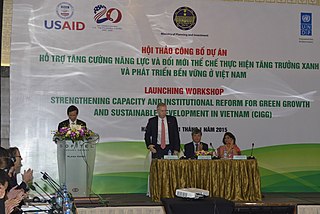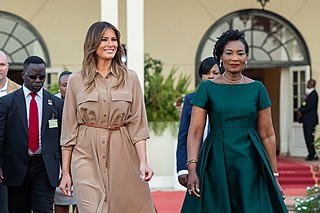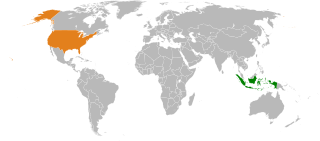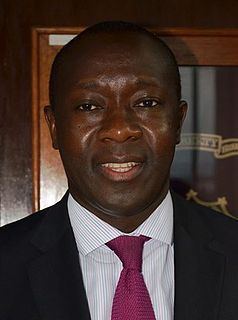Related Research Articles
The United States Agency for International Development (USAID) is an independent agency of the United States federal government that is primarily responsible for administering civilian foreign aid and development assistance. With a budget of over $27 billion, USAID is one of the largest official aid agencies in the world and accounts for more than half of all U.S. foreign assistance—the highest in the world in absolute dollar terms.
Good governance is the process of measuring how public institution conduct public affairs and manage public resources and guarantee the realization of human rights in a manner essentially free of abuse and corruption and with due regard for the rule of law. Governance is "the process of decision-making and the process by which decisions are implemented ". Governance in this context can apply to corporate, international, national, or local governance as well as the interactions between other sectors of society.

Development aid is aid given by governments and other agencies to support the economic, environmental, social, and political development of developing countries. Closely-related concepts include: foreign aid,international aid, overseas aid, developmental aid, developmentassistance, official development assistance (ODA), development cooperation and technical assistance. It is distinguished from humanitarian aid by aiming at a sustained improvement in the conditions in a developing country, rather than short-term relief. Development aid is thus widely seen as a major way to meet Sustainable Development Goal 1 for the developing nations.
Aid effectiveness is the degree of success or failure of international aid. Concern with aid effectiveness might be at a high level of generality, or it might be more detailed.

Capacity building is the improvement in an individual or organization's facility "to produce, perform or deploy". The terms capacity building and capacity development have often been used interchangeably, although a publication by OECD-DAC stated in 2006 that capacity development was the preferable term. Since the 1950s, international organizations, governments, non-governmental organizations (NGOs) and communities use the concept of capacity building as part of "social and economic development" in national and subnational plans. The United Nations system defines itself by "capacity development;" as the "how" for "'how UNDP works" to fulfill its mission The UN system applies it in almost every sector, including now several of the Sustainable Development Goals. For example, the United Nations Sustainable Development Goal 17 advocates for enhanced international support for capacity building in developing countries to support national plans to implement the 2030 Agenda.
The Dominican Republic has achieved impressive increases in access to water supply and sanitation over the past two decades. However, the quality of water supply and sanitation services remains poor, despite the country's high economic growth during the 1990s.
Global Integrity is an independent, nonprofit organization tracking governance and corruption trends around the world using local teams of researchers and journalists to monitor openness and accountability. Global Integrity's reporting has been cited by over 50 newspapers worldwide, and is used by the World Bank, USAID, Millennium Challenge Corporation and other donor agencies to evaluate aid priorities. Global Integrity's methodology differs considerably from existing metrics of governance and corruption by using local experts and transparent source data, rather than perception surveys. Unlike traditional charities, Global Integrity is a hybrid organization that seeks to generate earned revenue to support its public-interest mission.
The 30-year civil war and 20 years of Soviet command economy left Angola in ruins and produced a centralized government with authoritarian tendencies that has made possible the ownership of the nation's resources by the president and his associates. They have used the government apparatus to allow themselves and their patronage networks a variety of legal and extra-legal options to extract private profit from Angola's economy.

The transition from a one-party state to a multi-party democracy significantly strengthened the already cordial U.S. relationship with Malawi. Significant numbers of Malawians study in the United States. The United States has an active Peace Corps program, Centers for Disease Control and Prevention, Department of Health and Human Servicess, and an Agency for International Development (USAID) mission in Malawi. Both countries have a common history and English language, as they were part of the British Empire.

The diplomatic relationship between the United States of America and Zambia can be characterized as warm and cooperative. Relations are based on their shared experiences as British colonies, both before, after and during the struggle for independence. Several U.S. administrations cooperated closely with Zambia's first president, Kenneth Kaunda, in hopes of facilitating solutions to the conflicts in Rhodesia (Zimbabwe), Angola, and Namibia. The United States works closely with the Zambian Government to defeat the HIV/AIDS pandemic that is ravaging Zambia, to promote economic growth and development, and to effect political reform needed to promote responsive and responsible government. The United States is also supporting the government's efforts to root out corruption. Zambia is a beneficiary of the African Growth and Opportunity Act (AGOA). The U.S. Government provides a variety of technical assistance and other support that is managed by the Department of State, U.S. Agency for International Development, Millennium Challenge Account (MCA) Threshold Program, Centers for Disease Control and Prevention, Department of Treasury, Department of Defense, and Peace Corps. The majority of U.S. assistance is provided through the President's Emergency Plan for AIDS Relief (PEPFAR), in support of the fight against HIV/AIDS.

Indonesia and the United States established diplomatic relations in 1949. Relations are generally strong and close. Both are republics, and each nation reciprocally recognizes the strategic importance of their counterpart.

Liberia – United States relations are bilateral relations between Liberia and the United States.

The United States and North Macedonia enjoy excellent bilateral relations.
Civil service reform is a deliberate action to improve the efficiency, effectiveness, professionalism, representativity and democratic character of a civil service, with a view to promoting better delivery of public goods and services, with increased accountability. Such actions can include data gathering and analysis, organizational restructuring, improving human resource management and training, enhancing pay and benefits while assuring sustainability under overall fiscal constraints, and strengthening measures for performance management, public participation, transparency, and combating corruption.
Drinking water supply and sanitation in Egypt is characterized by both achievements and challenges. Among the achievements are an increase of piped water supply between 1998 and 2006 from 89% to 100% in urban areas and from 39% to 93% in rural areas despite rapid population growth; the elimination of open defecation in rural areas during the same period; and in general a relatively high level of investment in infrastructure. Access to an at least basic water source in Egypt is now practically universal with a rate of 98%. On the institutional side, the regulation and service provision have been separated to some extent through the creation of a national Holding Company for Water and Wastewater in 2004, and of an economic regulator, the Egyptian Water Regulatory Agency (EWRA), in 2006.
The Global Program on Fisheries (PROFISH) is a global program on sustainable fisheries established by the World Bank in 2005. It has been set up in conjunction with key donors and stakeholders to meet the challenge of a growing crisis in the world fisheries sector.
The Office of Transition Initiatives (OTI) is part of the United States Agency for International Development (USAID) Bureau for Democracy, Conflict, and Humanitarian Assistance (DCHA) and was developed to provide fast, flexible, short-term assistance to take advantage of windows of opportunity to build democracy and peace. It seeks to lay the foundations for long-term development by promoting reconciliation, jump starting economies and helping stable democracy take hold.

Corruption in Somalia pertains to purported levels of corruption within Somalia's public and private sectors according to official metrics, anti-graft measures aimed at addressing those issues, as well as political dispensations and structural changes in government affecting transparency. Owing to a reported lack of accountability in the receipt and expenditure of public funds by the Transitional Federal Government, a federal Anti-Corruption Commission was put into place in 2011 so as to deter and eliminate graft. Somalia ranked joint last in Transparency International's 2014 Corruption Perceptions Index, which measures the perception of public sector corruption around the world.

Amara M. Konneh a Liberian national with more than 25 years of experience in humanitarian, private sector, government, and international development work, is a Senior Advisor on Partnerships and Regional Integration covering Africa for the World Bank. In this role, he advises the World Bank on regional economic integration to create economic hubs for value chains and helps build strategic partnerships with Africa's regional economic commissions. Prior to that, he served as Lead Advisor for the Bank's engagements in countries affected by fragility, conflict, violence, and forced displacement with emphasis on Ethiopia, Eritrea, Kenya, and Nigeria.
International Business Initiatives Corp., or IBI, is an economic development and public financial management consulting firm based in Arlington, Virginia with projects throughout the developing world. It is well-known for its implementation of the Governance and Economic Management Assistance Program (GEMAP) in Liberia from 2005-2010, its implementation of a follow-on project called the Governance and Economic Management Support (GEMS) project, and most recently its recognition as USAID’s 2015 Small Business of the Year. It uses performance improvement methodologies to design and implement Information & Communications Technology solutions adapted to local conditions.
References
- 1 2 Renata, Dwan (May 2006). "GEMAP" (PDF). World Bank. Retrieved July 12, 2016.
- ↑ "Governance and Economic Management Assistance Program" (PDF). World Bank. Retrieved July 12, 2016.
- ↑ "Final Evaluation of USAID GEMAP Activities" (PDF). June 2010. Retrieved July 12, 2016.